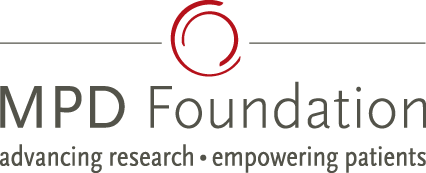On a daily basis at least one of us at the MPD Foundation office is actively thinking about MPD treatments - mostly how to find more through our various projects. Whether planning a fundraiser, assisting a patient support group coordinator or looking at grant proposals, everything points back to creating an opportunity for MPD patients to live better and live longer. But recently the issue of access has taken up more space in our thoughts.
For many MPD patients, getting their diagnosis is a first step in a complicated path. There are many layers to get through in pursuit of good care, including diagnosis, finding the right physician, choosing among treatment options and dealing with insurance. It is in this last step that many MPD patients face frustration. There is still much to learn about Myeloproliferative Disorders; insurance companies and Medicare are dealing with a learning curve in how to classify PV, ET and MF and how to categorize treatments not to mention how to price them appropriately.
This scenario isn't specific to MPDs, as an article in American Health & Drug Benefits points out. Orphan disease treatments in general pose an issue for health coverage providers and consequently, patients. Insurers vary on how they interpret FDA rulings about the use of a drug. For a hypothetical example, if a drug is developed for sickle cell anemia specifically but research has found it is also useful for polycythemia vera, insurers don't necessarily provide coverage for that treatment and will not agree with each other on standards.
Our hope is that as research advances and more treatments are approved insurers and Medicare develop the flexibility to address orphan diseases like myeloproliferative disorders in a manner that works for patients.
www.mpdfoundation.org
For many MPD patients, getting their diagnosis is a first step in a complicated path. There are many layers to get through in pursuit of good care, including diagnosis, finding the right physician, choosing among treatment options and dealing with insurance. It is in this last step that many MPD patients face frustration. There is still much to learn about Myeloproliferative Disorders; insurance companies and Medicare are dealing with a learning curve in how to classify PV, ET and MF and how to categorize treatments not to mention how to price them appropriately.
This scenario isn't specific to MPDs, as an article in American Health & Drug Benefits points out. Orphan disease treatments in general pose an issue for health coverage providers and consequently, patients. Insurers vary on how they interpret FDA rulings about the use of a drug. For a hypothetical example, if a drug is developed for sickle cell anemia specifically but research has found it is also useful for polycythemia vera, insurers don't necessarily provide coverage for that treatment and will not agree with each other on standards.
Our hope is that as research advances and more treatments are approved insurers and Medicare develop the flexibility to address orphan diseases like myeloproliferative disorders in a manner that works for patients.
www.mpdfoundation.org

No comments:
Post a Comment